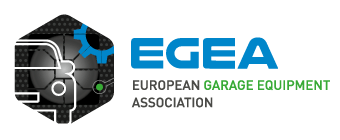Leon Andriessen is the new EGEA President

Dutchman Leon Andriessen is the new President of the European Garage Equipment Association (EGEA). The EGEA General Assembly elected Andriessen to head the association on September 9, 2024 in Frankfurt. He has been involved in the association’s political work at the European level for many years. He has already been the president of EGEA in the past. In recent years, Leon Andriessen has been overseeing the EGEA’s finances as treasurer. Andriessen is a founder of TBA & TEN, Technisch Bureau Andriessen & Test Equipment Nederland. His company was established on the 1st of August 1978. He officially retired on the 1st of January 2021 but is still active in his company, run now by his son Patrick. Andriessen is the representative of the Dutch trade association RAI in the EGEA.
The President is supported by the Vice Presidents Rafal Sosnowski from the Polish association STM, Julian Woods from the British association GEA and the new Treasurer Thierry Coton from the French association GIEG, who were also newly elected in Frankfurt.
Experienced board team guarantees continuity
There was also a change in the Executive Board. The Executive Board, which manages the business of the EGEA together with the Presidium and Secretary General Marcin Barankiewicz, now includes three other members in addition to the Presidents. For the next two years, these will be Frank Beaujean (ASA Federal Association, Germany), Jaume Berenguer Baques (AFIBA, Spain) and Federica Ventura (AICA, Italy).
With the exception of Federica Ventura from AICA, the successor to Massimo Brunamonti, who has retired, the EGEA Board has been working together in its current composition since 2018. “I am delighted to have been elected EGEA President. I am confident that with the proven and strong team on the Board, we will be able to set an important course for the future of the workshop equipment industry in Europe over the next two years through the EGEA,” says EGEA President Leon Andriessen.
Challenges threaten the European economy, the automotive sector and the IAM
Andriessen made it clear that he would continue the course set by his predecessor in the presidency, Frank Beaujean. The issue of data access for the independent aftermarket is an absolute priority, he said “The President of the European Commission, Ursula von der Leyen, has announced that the priority in the new term of office of the Commission under her leadership will be to maintain the competitiveness of the European economy. We will judge her by her actions. The independent aftermarket is unanimous in its opinion that one of the elements with which this goal can be achieved is regulating access to the data generated by vehicles. The industry has long been calling for sectoral solutions in this area and points out that the Data Act is too general and does not take into account the specifics of the automotive industry,” said Andriessen.
EGEA is covering the interests of all the market stakeholders, not only the big ones, but also the small and mid-sized companies. In this matter, access to increasingly digitalized and networked vehicle data infrastructures is of existential importance for the entire Independent Aftermarket (IAM).
Revitalizing working groups and finding new members
Another goal of the new EGEA President: “I want to strengthen the working groups within the EGEA and create new ones.” To do this, the EGEA needs the committed cooperation of member companies from all national associations. “Only if we know the needs and requirements can we bundle these as the EGEA at European level and represent them in the relevant committees in a targeted manner,” says Andriessen. The Executive Committee and Board have identified electromobility as a key future topic for the European workshop equipment industry, which will have a major impact on the automotive industry in the future despite all the teething troubles. The same applies to all topics relating to digitalization and artificial intelligence.
President Andriessen would therefore also like to attract new members to the EGEA in order to tackle the wide range of tasks. “Having a strong organization that represents interests at European level is vital for the industry. Regulations are being created in Brussels and Strasbourg that will later affect the work of all member companies in all national associations. If we have the opportunity to make our views clear and contribute our technical expertise at an early stage, all workshop equipment suppliers in Europe will benefit,” says Andriessen.
Goal: World association of workshop equipment suppliers.
At an international level, the association wants to further promote both the AFCAR (Alliance for the Freedom of Car Repair in Europe) and the “Associations in Motion” project. The long-term goal of this project is to establish a global association of workshop equipment manufacturers.









